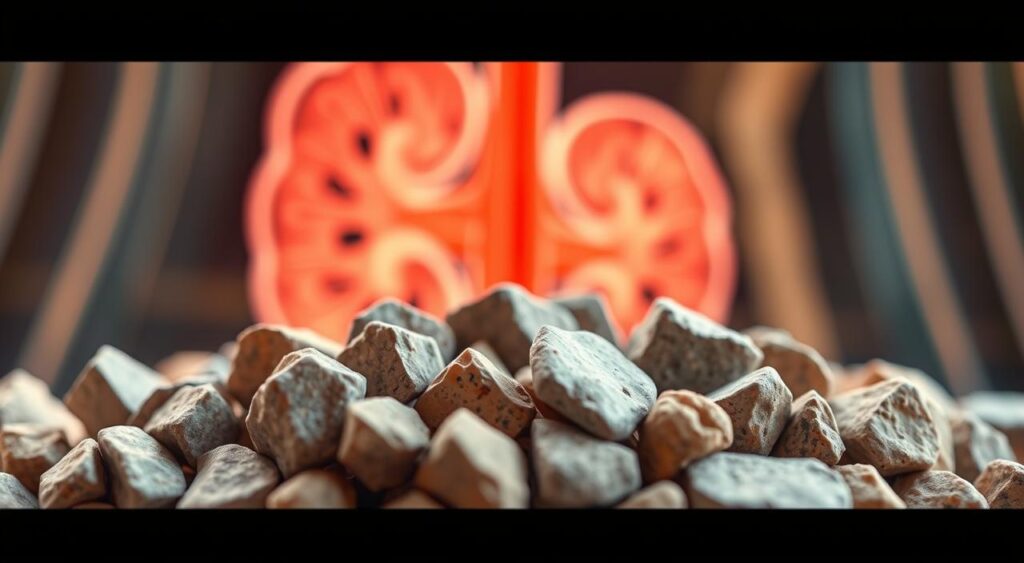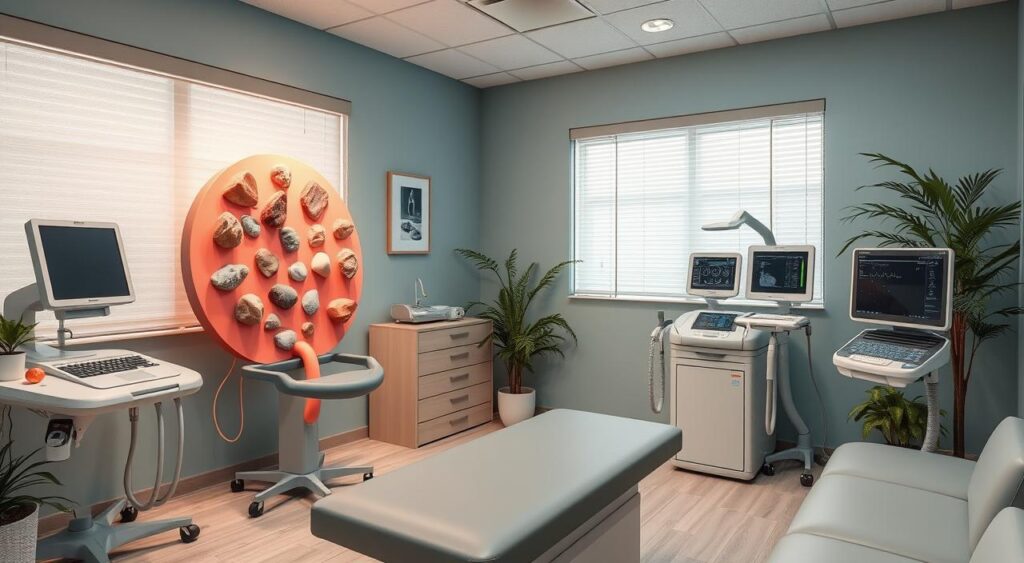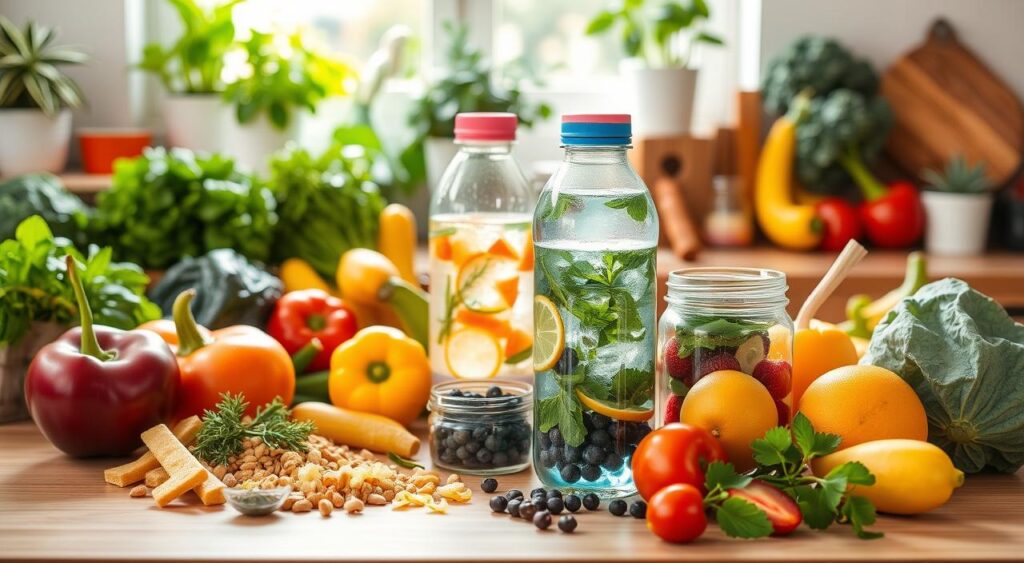Did you know 1 in 10 people will get renal calculi, or kidney stones, at some point? These stones are a common problem that hurts millions worldwide. It’s important to know about renal calculi to keep your urinary system healthy and avoid serious issues. Things like diet, how much you drink, and your genes can cause these stones.
Kidney stones are hard deposits that form in the kidneys. They can cause a lot of pain, nausea, and vomiting. The process of making these stones involves minerals in your urine. Your diet, lifestyle, and genes can all play a part in this. Knowing what can lead to kidney stones helps you prevent them and lower your risk.

Early detection and treatment are key to managing renal calculi. If you notice symptoms like severe pain, nausea, and vomiting, get medical help right away. This can help avoid serious problems and improve your health. In this article, we’ll look at the symptoms, diagnosis, and prevention of renal calculi. We’ll also cover the latest treatments and how to manage this condition.
Key Takeaways
- Risk of developing renal calculi, or kidney stones, is high, with 1 in 10 people affected
- Understanding the causes and risk factors associated with renal calculi is crucial for prevention
- Early detection and treatment of kidney stones is key to reducing the risk of complications
- Diet, lifestyle, and genetics can all play a role in the formation of kidney stones
- Recognizing the symptoms of renal calculi, such as severe pain and nausea, is critical for seeking medical attention
- Prevention strategies, such as staying hydrated and maintaining a healthy diet, can help to reduce the risk of developing kidney stones
- Renal calculi can have a significant impact on a person’s quality of life, making it essential to seek medical attention if symptoms persist
Understanding Renal Calculi: An Overview
Renal calculi, or kidney stones, are a common health issue worldwide. The terms nephrolithiasis and urolithiasis describe kidney stones. These stones can cause severe pain and discomfort.
To understand renal calculi, it’s important to know what kidney stones are. We also need to know the different types and how they affect urinary health.
Kidney stones form when minerals and substances concentrate in the urine. Nephrolithiasis and urolithiasis can be caused by genetics, diet, and medical conditions. Renal calculi can significantly impact urinary health, causing symptoms like pain, bleeding, and frequent urination.
What Are Kidney Stones?
Kidney stones are small, hard deposits that form in the kidneys. They occur when there’s an imbalance of water, salts, and other substances in the urine. These stones can be made of calcium, uric acid, and cystine.
Types of Renal Calculi
There are several types of renal calculi, including:
- Calcium stones: the most common type of kidney stone
- Uric acid stones: often associated with diets high in meat, seafood, and sweets
- Cystine stones: rare and usually occur in people with a genetic disorder
The Impact on Urinary Health
Renal calculi can significantly impact urinary health. Symptoms include:
- Pain in the side or back
- Bleeding in the urine
- Frequent urination
- Nausea and vomiting
Understanding the causes and symptoms of renal calculi is crucial. Knowing the risks and taking preventive steps can reduce the chance of developing nephrolithiasis and urolithiasis.
| Type of Kidney Stone | Cause | Symptoms |
|---|---|---|
| Calcium stones | Imbalance of calcium and other substances in the urine | Pain, bleeding, frequent urination |
| Uric acid stones | Diet high in meat, seafood, and sweets | Pain, bleeding, frequent urination |
| Cystine stones | Genetic disorder | Pain, bleeding, frequent urination |
Common Causes and Risk Factors
Renal calculi, or kidney stones, can come from many sources. Diet, how much you drink, and your genes all play a part. Some medical issues, like gout or inflammatory bowel disease, can also raise your risk. Knowing what causes these stones is key to preventing and managing them.
Here are some common reasons for renal calculi:
- Dehydration: Not drinking enough water can make your urine more concentrated. This can lead to stone formation.
- Diet: Eating a lot of animal protein, sodium, and sugar can up your stone risk.
- Genetics: Your family history can influence your chances of getting kidney stones.
Research shows that some medical conditions can also lead to renal calculi. For instance, those with hyperparathyroidism are more prone to stones.
Understanding the causes and risk factors of renal calculi helps you take action. You can lower your stone risk by drinking plenty of water, eating right, and managing any health issues you have.
| Cause | Description |
|---|---|
| Diet | A diet high in animal protein, sodium, and sugar can increase the risk of developing kidney stones. |
| Hydration | Not drinking enough water can increase the concentration of minerals in the urine, leading to the formation of stones. |
| Genetics | Family history can play a role in the development of renal calculi. |
Identifying Renal Calculi Symptoms
Renal calculi symptoms can vary and might look like other health issues. It’s key to spot early signs to get medical help fast. Common symptoms include severe pain, nausea, and vomiting.
Some may feel mild symptoms that seem like other problems. Others might have severe symptoms needing quick medical care. Knowing these symptoms helps in getting the right treatment.
Early Warning Signs
- Persistent pain in the side or back
- Nausea and vomiting
- Frequent or painful urination
Severe Symptoms Requiring Immediate Attention
Severe symptoms of renal calculi can be dangerous and need urgent care. Look out for severe pain, vomiting, and trouble urinating.
Associated Complications
Ignoring renal calculi symptoms can lead to serious issues like kidney damage or infection. If symptoms don’t go away or get worse, see a doctor right away.
The Formation Process of Kidney Stones
Kidney stones form when there’s an imbalance of water, salts, and other substances in the urine. This imbalance causes minerals to crystallize and stick together. This results in the formation of kidney stones. The process is complex and involves diet, hydration, and how concentrated the urine is.
Some key factors that contribute to kidney stones include:
- Dehydration: Not drinking enough water makes urine more concentrated. This increases the risk of kidney stone formation.
- Diet: Eating a lot of animal protein, sodium, and sugar can also increase the risk.
- Genetics: Some people might be more likely to get kidney stones because of their genes.
Knowing how kidney stones form can help prevent them. By staying hydrated and eating a balanced diet, people can lower their risk. This can help prevent kidney stones.
Diagnostic Methods for Renal Calculi
Diagnosing renal calculi involves several steps. Doctors use physical exams, imaging tests, and lab work. These steps help confirm kidney stones and find their size and location. A detailed diagnosis is key for the right treatment and avoiding complications.
A doctor will first look for signs of pain or tenderness. This is a clue that might show kidney stones. Then, imaging tests are used to see more clearly.
- CT scans
- Ultrasounds
- X-rays
Imaging Tests
Imaging tests are vital for diagnosing kidney stones. They show the stones’ size and where they are. These tests also check for any blockages or other issues related to the stones.
Laboratory Analysis
Lab tests on urine and blood are also important. They help find out if there are kidney stones and what might be causing them. Tests look for infections, inflammation, and other factors linked to stone formation.
Treatment Options and Management
Renal stone treatment depends on the stone’s size and location. For small stones, watchful waiting might be suggested, as they can pass naturally. But for bigger stones, medical help is needed to avoid problems.
Some common treatments for kidney stones include:
- Medication to help pass stones
- Surgical procedures, such as lithotripsy or ureteroscopy, for larger stones
- Pain management medication to ease discomfort
Managing kidney stones well is key to prevent them from coming back. Drinking plenty of water, eating a healthy diet, and avoiding certain foods can help. Knowing your treatment options and taking steps to prevent stones can help manage your condition.

Seeing a healthcare professional for a proper diagnosis and treatment is crucial. They can guide you on the best treatment and preventive steps.
| Treatment Option | Description |
|---|---|
| Watchful Waiting | Monitoring small stones to see if they pass on their own |
| Medication | Prescribing medication to help pass stones or alleviate pain |
| Surgical Procedures | Performing surgery to remove larger stones |
Medical Interventions and Surgical Procedures
Medical treatments and surgeries are key in treating kidney stones. They help ease symptoms and stop more problems. The main goal is to help stones pass, manage pain, and stop new stones from forming.
The treatment depends on the stone’s size, location, and type, and the patient’s health. Doctors follow guidelines to choose the best treatments. These can include medicines, small procedures, or surgery.
Medication Approaches
Medicines help with pain, reduce swelling, and help small stones pass. This is a big step in preventing more kidney stones.
Minimally Invasive Treatments
Small procedures, like lithotripsy, use shock waves to break stones into smaller pieces. This makes it easier for the body to pass them out.
Traditional Surgery Options
Sometimes, surgery is needed for big or hard-to-move stones. It’s used when other methods fail. It’s a key part of preventing kidney stones.
Knowing about these treatments helps people take steps to prevent kidney stones. It also lowers the chance of future problems.
Lifestyle Modifications for Prevention
To prevent kidney stones, you need to make some lifestyle changes. This includes eating right, drinking enough water, and exercising regularly. These steps can lower your risk of getting kidney stones and keep you healthy.
Dietary Changes
It’s important to eat less of foods that can cause kidney stones. These include oxalate, calcium, and uric acid. Eating more fruits, vegetables, and whole grains can help. Some foods that are good for prevention of kidney stones are:
- Citrus fruits, such as oranges and lemons
- Leafy greens, such as spinach and kale
- Whole grains, such as brown rice and quinoa
Hydration Guidelines
Drinking enough water is key to preventing kidney stones. Water helps dilute your urine and lowers the risk of stone-forming substances. Try to drink 8-10 glasses of water every day.

Exercise Recommendations
Exercising regularly can also help prevent kidney stones. It keeps you healthy and improves blood flow. Aim for 30 minutes of moderate exercise daily, like brisk walking or cycling.
| Lifestyle Modification | Recommendation |
|---|---|
| Dietary Changes | Limit stone-forming substances, increase fruits and vegetables |
| Hydration Guidelines | Drink at least 8-10 glasses of water per day |
| Exercise Recommendations | Aim for 30 minutes of moderate-intensity exercise per day |
Natural Remedies and Alternative Treatments
For those with renal calculi, or kidney stones, natural remedies can offer relief. These include herbal supplements, homeopathic remedies, and dietary changes.
Some natural remedies for renal calculi include:
- Increasing fluid intake to help flush out kidney stones
- Using herbal supplements like chanca piedra to help dissolve stones
- Practicing stress-reducing techniques, such as meditation or yoga, to help manage pain
It’s crucial to talk to a healthcare provider before trying natural remedies or alternative treatments for renal calculi. They can guide you on the best treatment and ensure it won’t harm you.
Making dietary changes can also help prevent kidney stones. This might mean eating less sodium, more calcium, and avoiding foods high in oxalate.
Exploring natural remedies and alternative treatments can help those with renal calculi. It can ease symptoms and help prevent future stones.
When to Seek Emergency Medical Care
Renal calculi symptoms can be very painful and uncomfortable. Sometimes, they can even be life-threatening. Knowing when to seek emergency care is crucial to avoid serious problems.
Red Flag Symptoms
Some symptoms need immediate medical help. These include severe pain, vomiting, and signs of infection like fever and chills. If you have any of these, go to the emergency room right away.
Emergency Room vs. Primary Care
For severe symptoms, the emergency room is the best place to go. But, if your symptoms are mild, see your primary care doctor. It’s important to know when to go to the emergency room versus your regular doctor.
If you’re not sure about your symptoms, it’s better to be safe and go to the emergency room. Quick treatment can prevent serious issues and improve your health.
Conclusion: Living with and Preventing Renal Calculi
Renal calculi, or kidney stones, can be tough to handle. But, with the right knowledge and steps, you can manage your urinary health. This can help lower the risk of nephrolithiasis (kidney stone formation) or urolithiasis (stones in the urinary tract).
Knowing the symptoms and getting the right diagnosis is crucial. Making lifestyle changes can also help prevent renal calculi. Drinking plenty of water, eating right, and exercising regularly can greatly reduce your risk.
If you do get renal calculi, getting medical help quickly is important. Following your treatment plan and going for regular check-ups can help manage the condition. This way, any new stones can be caught and treated early.
By being proactive about preventing and managing kidney stones, you can keep your urinary tract healthy. This leads to a better quality of life. Remember, with the right steps, you can live well with and prevent renal calculi.
FAQ
Q: What are kidney stones?
A: Kidney stones are hard deposits made of minerals and salts. They form inside the kidneys. These stones can be different sizes and shapes. They can cause a lot of pain and discomfort if they block urine flow.
Q: What are the common types of renal calculi?
A: The most common types of kidney stones are calcium oxalate, calcium phosphate, uric acid, and cystine stones. Each type is made from different substances that concentrate in the urine.
Q: What are the main causes of kidney stones?
A: Kidney stones can form due to dehydration, a diet high in certain minerals and salts, and certain medical conditions. Genetic factors also play a role. Obesity, diabetes, and high blood pressure can increase your risk.
Q: What are the typical symptoms of kidney stones?
A: Symptoms of kidney stones include severe pain in the back, abdomen, or groin. You may also see blood in your urine, feel nauseous, vomit, or have trouble urinating. Smaller stones might not cause symptoms until they move and block the urinary tract.
Q: How are kidney stones diagnosed?
A: Doctors use physical exams, imaging tests like CT scans or ultrasounds, and urine and blood tests to diagnose kidney stones. These methods help find out the size, location, and type of the stones.
Q: What are the treatment options for kidney stones?
A: Treatment for kidney stones varies. It can include drinking more fluids, taking pain medication, or more invasive procedures like ESWL or surgery. The choice depends on the stone’s size, location, and type.
Q: How can I prevent the formation of kidney stones?
A: To prevent kidney stones, drink plenty of water, eat less high-oxalate and high-sodium foods, and maintain a healthy weight. Manage conditions like diabetes or high blood pressure. Regular exercise and dietary changes can also help prevent them.
